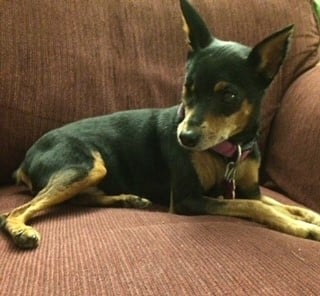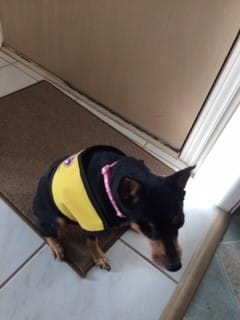



 It’s early August in 2015, and Greg and I are on Heart’s Content Road, off on an excursion to find the Peter Bronck House during our yearly vacation to Winter Clove Inn in Round Top, NY, when we see this little thing sitting on the center line. As we get closer, we realize it’s a dog. I pull over and turn on the flashers, and Greg gets out and starts to follow it as it walks into the woods. A few minutes later, he comes back with the dog in his arms and gets into the car. We call Animal Control in Catskill, NY—after a few false starts when we call Animal Control in the wrong town, since Heart’s Content Road goes through there in the direction we’re traveling—and agree to meet the officer across Route 32 by a farm. Meanwhile, the dog has settled onto Greg’s lap, as if to say, “Oh, thank you so much for taking me in.” She looks like four sticks with a skeleton on top; she’s dirty, and we realize she must be blind because she has the weirdest eyes we’ve ever seen. There is brown fur covering them. Also bugs crawling on them. She has no tags and no ID, and her collar says “Bad to the Bone.” But she seems to have magnetic fur. Our hands are drawn to pet her and our voices to comfort her. We decide right then and there that if her owner can’t be found, we will adopt her. And call her Rhody, since we found her in the road.
It’s early August in 2015, and Greg and I are on Heart’s Content Road, off on an excursion to find the Peter Bronck House during our yearly vacation to Winter Clove Inn in Round Top, NY, when we see this little thing sitting on the center line. As we get closer, we realize it’s a dog. I pull over and turn on the flashers, and Greg gets out and starts to follow it as it walks into the woods. A few minutes later, he comes back with the dog in his arms and gets into the car. We call Animal Control in Catskill, NY—after a few false starts when we call Animal Control in the wrong town, since Heart’s Content Road goes through there in the direction we’re traveling—and agree to meet the officer across Route 32 by a farm. Meanwhile, the dog has settled onto Greg’s lap, as if to say, “Oh, thank you so much for taking me in.” She looks like four sticks with a skeleton on top; she’s dirty, and we realize she must be blind because she has the weirdest eyes we’ve ever seen. There is brown fur covering them. Also bugs crawling on them. She has no tags and no ID, and her collar says “Bad to the Bone.” But she seems to have magnetic fur. Our hands are drawn to pet her and our voices to comfort her. We decide right then and there that if her owner can’t be found, we will adopt her. And call her Rhody, since we found her in the road.
We get to the farm and we’re waiting by the side of the road when the farm lady comes out and asks what we’re doing there, and we explain that we’re waiting for Animal Control because we found this dog. She brings out a dish of water and lets us allow the dog to walk on her property. We notice that the dog—a Miniature Pinscher—is limping.
The Animal Control officer shows up a few minutes later, sticks a towel on the front seat of his truck and puts the little doggie on it, and she promptly stands up to look out the window, which we think is kind of funny because we don’t think she can see, but she’s acting like dogs in cars are supposed to act. He tells us they will be bringing her to the Columbia-Greene Humane Society in Hudson.
We spend the rest of the afternoon going to each of the nine resorts in the area, asking if anyone lost a dog, but the answer is always, “We don’t allow dogs.” Of course, this dog is so small that she could easily have been snuck in. We also put up a note in the post office and list her on LostMyDoggie.com.
The next day, we go across the Hudson River to the Columbia-Greene Humane Society. They won’t let us visit—she’s in quarantine—but we fill out adoption paperwork and specify that we want THIS dog, and if she’s not available, we don’t want a different dog.
 After about three weeks, with a couple of calls in between to find out what’s happening, I get the call that we can pick up our dog. e drive the two hours to Hudson and find our dog, now clean and with the brown fur removed from her eyes, having gotten her shots and a new collar. We tell them they can keep the “Bad to the Bone” one. They named her Sabrina, but we tell them her new name is Rhody.
After about three weeks, with a couple of calls in between to find out what’s happening, I get the call that we can pick up our dog. e drive the two hours to Hudson and find our dog, now clean and with the brown fur removed from her eyes, having gotten her shots and a new collar. We tell them they can keep the “Bad to the Bone” one. They named her Sabrina, but we tell them her new name is Rhody.
Rhody does fine on the two-hour drive back to Connecticut. She gets home and we walk her around the house. We introduce her to a wonderful plush doggie bed, and she settles right in. She probably thinks she has gone to heaven, after being out in the wild for enough time to lose probably half her body weight. Gradually, we get to know each other and she learns her name, although Greg spends time calling her by every dog name he can think of to see if she might know one of them. She doesn’t. I have nightmares thinking about her alone in the woods, running from bears or coyotes or other dogs, hungry and thirsty, laying in the road after being hit by a car. And I’m so glad she doesn’t have to worry any more.
One day while walking in Mill Pond Park, we meet a man walking with a younger man with some obvious challenges. The young man is wearing a helmet and is quite unsteady on his feet. The older gentleman bends down to pet Rhody; I pick her up and the younger man struggles, but eventually pets her and gets very excited about it. A couple of days later, I run into them again, and when I pick Rhody up for the young man to pet, he has a lot of trouble coordinating his hand movements; so Rhody takes her front paw and places it on his arm.
And I realized that Rhody needs to be a therapy dog.
Rhody and I spend time in Doggy School, learning basic obedience, which she does easily despite her disabilities. Her solid black eyes are caused by thick pigment from a severe case of dry eye—she makes no tears—and her limp is from an old pelvic fracture. Rhody lets me put in three kinds of eye drops four times a day, and each time gives me a grateful lick of thanks. We discover that she has Addison’s Disease, and she gladly takes her prednisone with peanut butter. She is soon ready to attend classes to be a therapy dog, but there’s a glitch. Shortly before the first class, she starts acting strange. An emergency visit reveals that she has acute glaucoma in her left eye due to a lens dislocation, and the best treatment is for her to have her eye removed. Around the same time, I find a lump near one of her nipples that turns out to be cancerous, and she needs surgery for that, too. We arrange for both procedures to be done at the same time. I am devastated. I so wanted Rhody to be able to do for others what she seems to do so naturally:, to bring comfort and peace, just by being there.
I talk to Rhody’s regular vet and ask about cancelling the therapy dog training. Her response is, “Why not let Rhody decide?” So I do. I bring Rhody to the first class with what Rhody thinks of as her “cone of pride.” And Rhody says, “I can do this!”
Rhody does her therapy dog evaluation right after she finishes her chemo. She passes on the first try. We begin visiting college campuses and the Aetna Comfort Corner. Rhody thinks this is a great gig—you sit on a blanket and people pet you!
Unfortunately, Rhody develops another cancer. It hasn’t spread, so we arrange to have it removed. If you had told me a year before that I would pay for two cancer surgeries for a dog, I would have told you that you were out of your mind, but Rhody has a good life and what’s more, she has a purpose and gives joy to others.
We go up to Winter Clove for Thanksgiving weekend a couple of weeks after Rhody’s surgery, and on a whim we decide to go to the farm lady who had given Rhody water when we first found her. We buy a thank you card and a scented candle. When we knock on the door with Rhody in our arms, at first she’s confused—who are you?—and then realizes, this is THAT dog! She remembers Rhody (but not us) and is so glad to see how beautiful Rhody looks, with a shiny coat and a wagging stump of a tail.
Right after we get home from Winter Clove, I notice that Rhody is walking funny. A visit to the vet doesn’t show anything specific, and we think maybe she hurt her paw on the rocky terrain at Winter Clove. When things don’t get better, I go back to the emergency vet and remark that her back seems to be hurting. They do an x-ray, but apart from the arthritis we knew she had they don’t see any spine problem. What they do see is spread of cancer to her lungs. I know that Rhody’s time with us is limited. I decide to try chemo and crate rest to give Rhody a few weeks of good time, but this plan fails quickly. Rhody is in pain, despite high doses of multiple pain medications and the chemo makes her vomit. She became unable to pee. I bring her to the vet and they have to remove urine from her bladder with a needle. For the first time in her life with us, she is miserable.
That Friday evening—two days after I learned the seriousness of what was going on with Rhody, she is resting on the couch next to me. She looks at me with her solid black eyes and I swear she says, “Mommy, I can’t do this anymore.”
Greg and I have a long discussion and the following morning we bring Rhody to her regular vet with her plush doggie bed, her softest blanket, and a pint of chocolate ice cream. We spend two hours saying goodbye, telling her everything she has meant to us and to the world for the short time she has been with us. We sing her the goodnight songs that have been part of her routine for the past 452 days. Rhody goes to sleep and is finally out of pain, but never out of our thoughts.